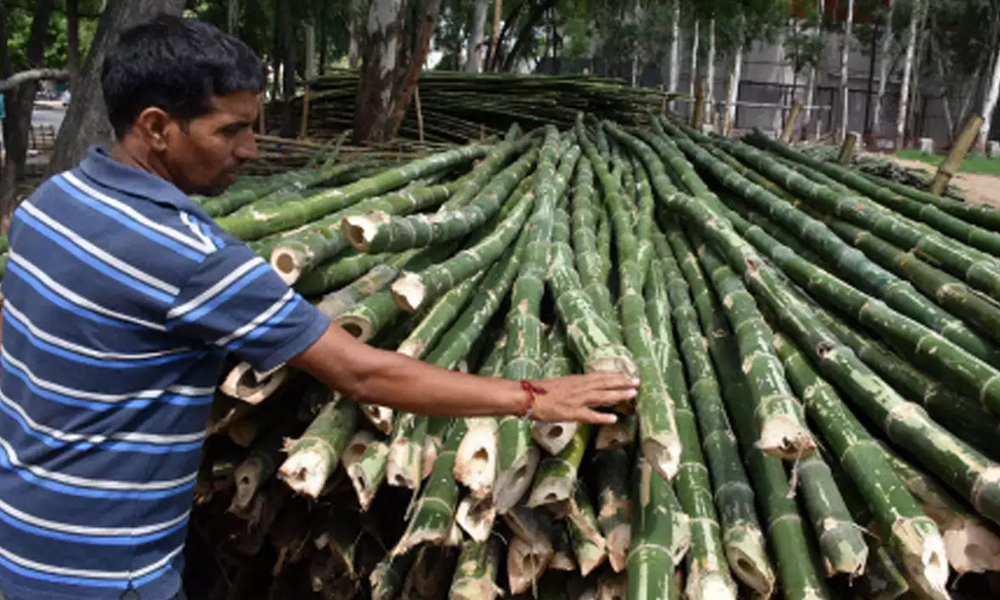
Image Credit: The Times Of India
Centre Proposes Replacing Of Steel Barriers With Bamboo To Prevent Road Mishaps On Highways
Writer: Ankita Singh
A literature lover who likes delving deeper into a wide range of societal issues and expresses her opinions about the same. Keeps looking for best-read recommendations while enjoying her coffee and tea.
India, 31 Jan 2021 10:46 AM GMT
Editor : Shubhendu Deshmukh |
Shubhendu, the quint essential news junky, the man who loves science and politics in equal measure and offers the complete contrast to it by being a fan of urdu poetry as well.
Creatives : Abhishek M
" An engineer by profession, Abhishek is the creative producer of the team, graphic designing is his passion and travelling his get away. In more ways than one, he makes the content visually appealing."
Experts from the Visvesvaraya National Institute of Technology are working on the design of barriers using Beema bamboo that is mainly found in Karnataka and adjoining areas.
With an aim to find innovative solutions to reduce road mishaps, the Centre has proposed to replace steel barriers, that help to reduce accident deaths on highways, with crash barriers made up of bamboo and coir has been made.
These barriers made of Beema bamboo and coir are being developed as a low-cost solution to bring down fatalities and mishaps on roads.
For implementing this newer method, experts from the Visvesvaraya National Institute of Technology (VNIT), Nagpur, are working on the design using Beema bamboo. It is the local product mainly found in Karnataka and adjoining areas.
Discussing this design, Nitin Gadkari, Union Minister for Road Transport and Highways said that they want farmers to grow the Beema bamboo, and the road sector will use it. He confirmed that right now, it costs around ₹4,000 per ton.
Sharing details of the design, Gadkari added that there would be five feet fencing of the bamboo installed deep into concrete slabs and held together by strong coir ropes.
"I am a farmer myself. My idea is that if we are to install crash barriers worth ₹25,000 crore per year in highway projects, let that money go to the country's farmers. So I have asked the experts to prepare this," said Gadkari.
He also said that along with awareness and enforcement of road safety rules, the road design that includes the installation of crash barriers, are established to enhance road safety, reported by The Indian Express.
However, the durability of such structures remains in question. Gadkari mentioned the strong bamboo structures used in the North-East that withstand extreme rainfall.
The primary purpose of using crash barriers is to prevent vehicles from going off highways. In case of any accident or mishaps, the barrier will cushion the impact and minimise the chance of fatality to the extent possible.
According to the report, conventional crash barriers made of metal and alloy may cost around ₹2,000 per metre. The bamboo barrier is extremely cost-effective, and it is likely to cost a fraction of that.
Gadkari said, "We will use jute, coir and such material, not plastic. That will benefit farmers. We will use them in all access-control highways so that humans and animals cannot stray into highways, and lives are saved," discussing the benefits of using such crash barriers.
Beema or Bheema bamboo is engineered to be a more robust, fast-growing and tall clone of the traditional bamboo found in the Indian subcontinent, especially in the North-East regions.
This variety is found to grow well in southern India. According to VNIT director Pramod Padole, the present iteration of the design of the Beema crash barrier being developed costs one-third of conventional metal barriers,
Further, Padole confirmed on behalf of VNIT that their department of Civil Engineering and Applied Mechanics are working on this. They will be testing how much load the structure can take, and other variables of the proposed design using computer simulation. Padole also said that once that proposed design is settled, they will proceed for actual installation on highways for on-site testing.
 All section
All section














